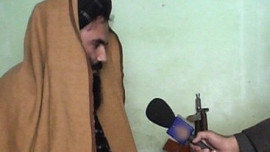
Following the publication of a six-year archive of classified military documents that link the ISI with the Taliban and other militant groups in Afghanistan, FO spokesperson Abdul Basit said: “These are far-fetched and skewed reports, evidently inconsistent with ground realities.”
The spokesperson said the allegations contained in the reports showed a “lack of understanding” of the complexities involved.
“Pakistan’s constructive and positive role in Afghanistan cannot be blighted by such self-serving and baseless reports,” Basit added. The previously classified documents were leaked by website Wikileaks on Sunday. The documents suggest that ISI representatives meet directly with the Taliban to formulate strategies to work against Afghan and coalition forces. Former chief of the ISI, General (Rtd) Hamid Gul also features heavily in the reports, which suggest he has been working to revive ties with personalities like Jalaluddin Haqqani and Gulbiddin Hekmatyar. The Haqqani group is currently the subject of intense US scrutiny, as Washington urges Islamabad to act against what it sees as a terror network. However, some experts interviewed by the NYT cautioned that a establishing a direct link between the ISI and terror networks like the al Qaeda was difficult.
The response to these reports in Pakistan on Monday was swift.
Ambassador to the US Husain Haqqani called the publication of the reports “irresponsible” and said they consisted of “unprocessed” reports from the field. “The US, Afghanistan and Pakistan are strategic partners and are jointly endeavoring to defeat the al Qaeda and its Taliban allies militarily and politically,” he said. “These reports are often proved wrong after deeper examination,” Haqqani continued, adding that the government was following “a clearly laid-out strategy of fighting and marginalizing terrorists, and our military and intelligence services are effectively executing that policy.”
Hamid Gul also dismissed the allegation contained in the reports, saying that they were “utterly wrong, totally fabricated and false.”
“They are talking about a 74-year-old general who retired long ago and has nothing to do with this. They are looking for some scapegoat and this is the sign of their defeat in Afghanistan,” said the former ISI chief.
Pakistan’s ambassador to Afghanistan, Mohammad Sadiq, said that regardless of how the documents were published, they cast the Obama administration in a very poor light.
The allegations cast by the reports could have far-reaching consequences, say analysts. Defence analyst Talat Masood said that such leaks threatened to undermine efforts to improve relations between Pakistan and the US.
“The report is contradictory as it contains assertions which officials contradict themselves. There is no substance in it,” he said. “These leaks really undermine relationship between US and Pakistan and actually promotes kind of an ill-will,” he added.
Security analyst Hasan Askari dismissed the leaks as out-of-date and put them in context of the intrigue in Afghanistan, where the ISI incites loathing, and the domestic political scene in the US.
“In 2009, Pakistan took actions and showed results,” Askari said. “These criticisms aren’t there any more.
“Groups who want to put pressure on the current US administration are behind this report. The anti-Obama lobby is releasing these reports at this stage because there are mid-term elections due in the United States.”
Meanwhile, reactions to the documents have poured in from around the world.
The Afghan government said on Monday that the information revealed in the reports was not surprising.
“Since 2006, since the first suicide bombing, we have talked about the role of (Pakistan’s) intelligence services,” Waheed Omar, President Hamid Karzai’s spokesperson, told reporters in Kabul.
The Kabul government welcomed the leaks, saying the documents could help “raise awareness on the sanctuaries” Islamabad provides for militant groups.
“We hope they (Pakistan) will take practical steps that convince everyone they don’t support them,” he said, referring to militant groups that include the Taliban, the al Qaeda and the Haqqani network.
The US and Britain have both condemned the leaks, saying that it has endangered the lives of personnel on the ground.
“We would lament all unauthorised releases of classified material,” a Downing Street spokesperson said on Monday. “We will not comment on leaked documents.”
In Washington, White House National Security Advisor James Jones said: “The US strongly condemns the disclosure of classified information by individuals and organizations which could put the lives of Americans and our partners at risk, and threaten our national security.”
Pentagon spokesman Colonel Dave Lapan called the release of the documents a ‘criminal act’ and said the defense department was scramblingto review the documents to determine “whether they reveal sources and methods,” endanger troops or harm national security.
The founder of the website Wikileaks, Julian Assange, defended his decision to publish the documents, however, saying that the reports would help shape understanding of the past six years of fighting.
In a press conference in London, Assange said his team had tried to ensure that the material would not put innocents in harms way. “All the material is over seven months old so is of no current operational consequence, even though it may be of very significant investigative consequence,” he said. (With additional information from AFP)
Published in The Express Tribune, July 27th, 2010.
























1714024018-0/ModiLara-(1)1714024018-0-270x192.webp)




















COMMENTS (3)
Comments are moderated and generally will be posted if they are on-topic and not abusive.
For more information, please see our Comments FAQ